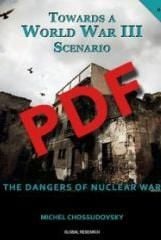Towards a WW III Scenario. The Privatization of Nuclear War. Michel Chossudovsky

Canadian economist Prof. Michel Chossudovsky criticizes the U.S. government for promoting nuclear war propaganda and advocating for the ‘safe use’ of nuclear weapons in conventional war. He highlights the brainwashing of decision-makers and the dangers of their own power.
Chossudovsky discusses the 2001 Nuclear Posture Review and the recategorization of nuclear weapons.
The short video below also addresses the role of Victoria Nuland in U.S. foreign policy and the neo-Nazi agenda embedded in regime change efforts.
Global Research Referral Drive: Our Readers Are Our Lifeline
****
Introductory Note by Michel Chossudovsky
At no point since the first atomic bomb was dropped on Hiroshima on August 6th, 1945, has humanity been closer to the unthinkable – a nuclear holocaust which could potentially spread in terms of radioactive fallout Worldwide .
All the safeguards of the Cold War era, which categorized the nuclear bomb as “a weapon of last resort”, have been scrapped. “Offensive” military actions using nuclear warheads are now described as acts of “self-defense”.
The August 6-8 2003 “Privatization of Nuclear’ War secret meeting was held behind closed doors at Strategic Command Headquarters at the Offutt Air Force Base in Nebraska.
It was conducive to a $1.3 trillion dollar nuclear weapons program initiated under the Obama administration, which is slated to increase to 2 trillion dollars by 2030.
Hiroshima Day, August 6, 2024
Towards a World War III Scenario:
The Privatization of Nuclear War
Michel Chossudovsky
August 7, 2011.
Introduction
At no point since the first atomic bomb was dropped on Hiroshima on August 6th, 1945, has humanity been closer to the unthinkable – a nuclear holocaust which could potentially spread in terms of radioactive fallout over a large part of the Middle East.
All the safeguards of the Cold War era, which categorized the nuclear bomb as “a weapon of last resort”, have been scrapped. “Offensive” military actions using nuclear warheads are now described as acts of “self-defense”.
The casualties from the direct effects of blast, radioactivity, and fires resulting from the massive use of nuclear weapons by the superpowers [of the Cold War era] would be so catastrophic that we avoided such a tragedy for the first four decades after the invention of nuclear weapons.1
During the Cold War, the doctrine of Mutually Assured Destruction (MAD) prevailed, namely that the use of nuclear weapons against the Soviet Union would result in “the destruction of both the attacker and the defender”.
In the post Cold war era, US nuclear doctrine was redefined. The dangers of nuclear weapons have been obfuscated.
Tactical nuclear weapons have been upheld as distinct, in terms of their impact, from the strategic thermonuclear bombs of the Cold War era.
Tactical nuclear weapons are identical to the strategic nuclear bombs. The only thing that differentiates these two categories of nuclear bombs are:
1) their delivery system;
2) their explosive yield (measured in mass of trinitrotoluene (TNT), in kilotons or megatons.
The tactical nuclear weapon or low yield mini-nuke is described as a small nuclear bomb, delivered in the same way as the earth penetrating bunker buster bombs.
While the technology is fundamentally different, tactical nuclear weapons, in terms of in-theater delivery systems are comparable to the bombs dropped on Hiroshima and Nagasaki in August 1945.
The Pentagon’s 2001 Nuclear Posture Review envisaged so-called “contingency plans” for an offensive “first strike use” of nuclear weapons, not only against “axis of evil” countries (including Iran and North Korea) but also against Russia and China.2
The adoption of the NPR by the US Congress in late 2002 provided a green light for carrying out the Pentagon’s pre-emptive nuclear war doctrine, both in terms of military planning as well as defense procurement and production. Congress not only rolled back its prohibition on low yield nuclear weapons, it also provided funding “to pursue work on so-called mini-nukes”. The financing was allocated to bunker buster (earth penetrator) tactical nuclear weapons as well as to the development of new nuclear weapons.3
Video. James Corbett Interviews Michel Chossudovsky
Hiroshima Day 2003: Secret Meeting at Strategic Command Headquarters
On August 6, 2003, on Hiroshima Day, [twenty two years ago] commemorating when the first atomic bomb was dropped on Hiroshima (August 6 1945), a secret meeting was held behind closed doors at Strategic Command Headquarters at the Offutt Air Force Base in Nebraska.
Senior executives from the nuclear industry and the military industrial complex were in attendance. This mingling of defense contractors, scientists and policy-makers was not intended to commemorate Hiroshima.
The meeting was intended to set the stage for the development of a new generation of “smaller”, “safer” and “more usable” nuclear weapons, to be used in the “in-theater nuclear wars” of the 21st Century.
In a cruel irony, the participants to this secret meeting, which excluded members of Congress, arrived on the anniversary of the Hiroshima bombing and departed on the anniversary of the attack on Nagasaki.
More than 150 military contractors, scientists from the weapons labs, and other government officials gathered at the headquarters of the US Strategic Command in Omaha, Nebraska to plot and plan for the possibility of “full-scale nuclear war”, calling for the production of a new generation of nuclear weapons – more “usable” so-called “mini-nukes” and earth penetrating “bunker busters” armed with atomic warheads.4
According to a leaked draft of the agenda, the secret meeting included discussions on “mini-nukes” and “bunker-buster” bombs with nuclear war heads “for possible use against rogue states”:
We need to change our nuclear strategy from the Cold War to one that can deal with emerging threats… The meeting will give some thought to how we guarantee the efficacy of the (nuclear) stockpile.5
The Privatization of Nuclear War: US Military Contractors Set the Stage
The post 9/11 nuclear weapons doctrine was in the making, with America’s major defense contractors directly involved in the decision-making process.
The Hiroshima Day 2003 meetings had set the stage for the “privatization of nuclear war”. Corporations not only reap multibillion-dollar profits from the production of nuclear bombs, they also have a direct voice in setting the agenda regarding the use and deployment of nuclear weapons.
The nuclear weapons industry, which includes the production of nuclear devices as well as the missile delivery systems, etc., is controlled by a handful of defense contractors with Lockheed Martin, General Dynamics, Northrop Grunman, Raytheon and Boeing in the lead.
It is worth noting that barely a week prior to the historic August 6, 2003 meeting, the National Nuclear Security Administration (NNSA) disbanded its advisory committee which provided an “independent oversight” on the US nuclear arsenal, including the testing and/or use of new nuclear devices.6
The above text is an excerpt from Michel Chossudovsky’s Towards a World War Three Scenario, The Dangers of Nuclear War.
please note: at the moment, this book is only available in PDF format
Financing the Culture of War
There are more than 5000 US nuclear weapons deployed. And now the US is committed to developing a generation of “more usable” low yield tactical nuclear weapons (bunker buster bombs) which are “harmless to the surrounding civilian population because the explosion is underground”.
“Blowing up the Planet” on a first strike basis as a instrument of peace and global security.
Those who decide on the use of nuclear weapons believe their own lies.
And what the US public does not know that is that on September 15, 1945, confirmed by declassified documents, the Truman administration released a secret plan to bomb 66 Soviet cities with 204 atomic bombs, at a time when the US and the Soviet Union were allies.
And those who dare to say that the use of nuclear weapons threatens the future of humanity are branded as “conspiracy theorists”.
The Privatization of Nuclear War
Video. James Corbett Interviews Michel Chossudovsky
Note to readers: Please click the share button above. Follow us on Instagram and Twitter and subscribe to our Telegram Channel. Feel free to repost and share widely Global Research articles.
Featured image is from Countercurrents
 “Towards a World War III Scenario: The Dangers of Nuclear War”
“Towards a World War III Scenario: The Dangers of Nuclear War”
by Michel Chossudovsky
Available to order from Global Research!
ISBN Number: 978-0-9737147-5-3
Year: 2012
Pages: 102
PDF Edition: $6.50 (sent directly to your email account!)
Michel Chossudovsky is Professor of Economics at the University of Ottawa and Director of the Centre for Research on Globalization (CRG), which hosts the critically acclaimed website www.globalresearch.ca . He is a contributor to the Encyclopedia Britannica. His writings have been translated into more than 20 languages.
Reviews
“This book is a ‘must’ resource – a richly documented and systematic diagnosis of the supremely pathological geo-strategic planning of US wars since ‘9-11’ against non-nuclear countries to seize their oil fields and resources under cover of ‘freedom and democracy’.”
–John McMurtry, Professor of Philosophy, Guelph University
“In a world where engineered, pre-emptive, or more fashionably “humanitarian” wars of aggression have become the norm, this challenging book may be our final wake-up call.”
-Denis Halliday, Former Assistant Secretary General of the United Nations
Michel Chossudovsky exposes the insanity of our privatized war machine. Iran is being targeted with nuclear weapons as part of a war agenda built on distortions and lies for the purpose of private profit. The real aims are oil, financial hegemony and global control. The price could be nuclear holocaust. When weapons become the hottest export of the world’s only superpower, and diplomats work as salesmen for the defense industry, the whole world is recklessly endangered. If we must have a military, it belongs entirely in the public sector. No one should profit from mass death and destruction.
–Ellen Brown, author of ‘Web of Debt’ and president of the Public Banking Institute

